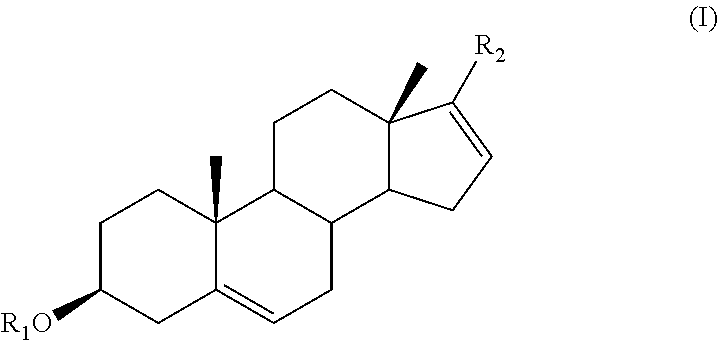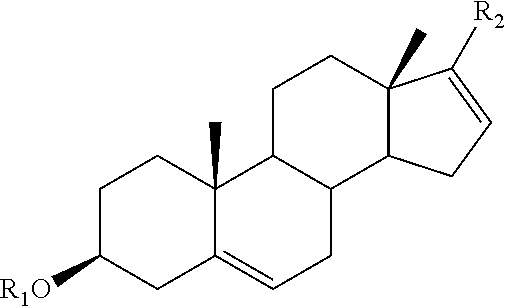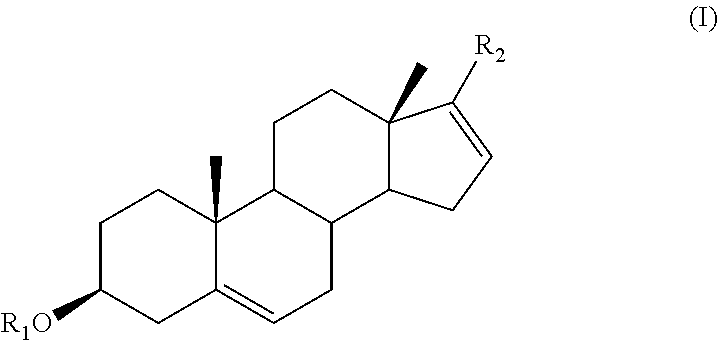Biomarkers for treatment of neoplastic disorders using androgen-targeted therapies
a technology of androgen and neoplastic disorders, applied in the field of biomarkers for treatment of neoplastic disorders using androgen-targeted therapies, can solve the problem that cancer is a significant burden on human health
- Summary
- Abstract
- Description
- Claims
- Application Information
AI Technical Summary
Benefits of technology
Problems solved by technology
Method used
Image
Examples
example 1
Galeterone Downregulates Both Wild-Type and Mutant AR
[0205]An experiment to detect expression of full-length AR and AR-V7 variant proteins was conducted in a CWR22rv1 cell line which constitutively expresses both AR and AR-V7. As shown in, FIG. 2, galeterone downregulates full-length and splice variant AR and reduces cell proliferation in this cell line. See also FIG. 4. Further, galeterone successfully overcomes abiraterone and enzalutamide resistance due to AR splice variants (FIG. 3). Galeterone, but not enzalutamide, reduces full-length and splice variant AR-V7 protein. Further, galeterone reduces AR-V7 in DU145 cells transfected with AR-V7 splice variant (FIG. 5). Similarly, lower levels of galeterone reduce full-length and splice variant AR-V7 with 72 hour exposure (FIG. 6).
example 2
Galeterone is Effective in a Model of Enzalutamide Resistance
[0206]As a pre-clinical model of Enzalutamide resistance, drug resistant and CRPC cell lines were derived from three generations of serially passaged Enzalutamide resistant, or vehicle control treated, LNCaP xenografts. Resistant cells (“49C” and “49F”) were maintained in vitro under constant exposure to 10 μM of Enzalutamide and were used to study the anti-cancer and AR targeting effects of Galeterone in the Enzalutamide resistant setting. Both 49F and 49C cell lines were found to have low expression of AR-V7. Using crystal violet and MTI assays, we found that Galeterone had anti-proliferative effects in LNCaP cells, in CRPC cells, and most importantly, in those resistant to Enzalutamide (FIG. 7). Dose-response studies of Galeterone in LNCaP cells and Enzalutamide resistant cell lines demonstrated similar EC50 for Galeterone in reducing cell viability in Enzalutamide resistant cell lines 49F and 49C, as compared to the E...
example 3
Galterone Activity in Castration Resistant Xenograft Tumors which Express Mutated Androgen Receptor
[0207]Galeterone was tested in a xenograft model of CRPC in mice. FIG. 16 shows that castration resistant tumors which express AR-V7 respond to galeterone. AR-V7 was detected in LuCaP136 castration resistant xenograft tumors using RT-PCR.
PUM
| Property | Measurement | Unit |
|---|---|---|
| time | aaaaa | aaaaa |
| time | aaaaa | aaaaa |
| time | aaaaa | aaaaa |
Abstract
Description
Claims
Application Information
 Login to View More
Login to View More - R&D
- Intellectual Property
- Life Sciences
- Materials
- Tech Scout
- Unparalleled Data Quality
- Higher Quality Content
- 60% Fewer Hallucinations
Browse by: Latest US Patents, China's latest patents, Technical Efficacy Thesaurus, Application Domain, Technology Topic, Popular Technical Reports.
© 2025 PatSnap. All rights reserved.Legal|Privacy policy|Modern Slavery Act Transparency Statement|Sitemap|About US| Contact US: help@patsnap.com



